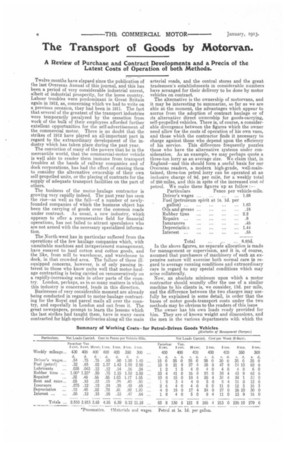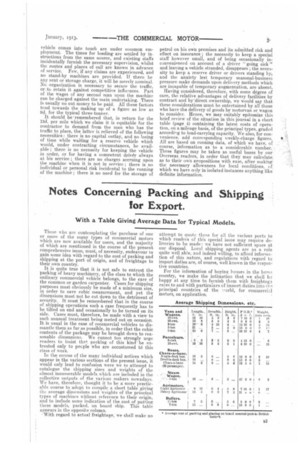The Transport of Goods by Motorvan.
Page 24

Page 25

If you've noticed an error in this article please click here to report it so we can fix it.
A Review of Purchase and Contract Developments and a Precis of the Latest Costs of Operation of both Methods.
Twelve months have elapsed since the publication of the last Overseas Annual of this journal, and this has been a period of very considerable industrial unrest, albeit of industrial prosperity, for the home country. Labour troubles were predominant in Great Britain again in 1912, as, concerning which we had to write on a previous occasion, they had been in 1911. The fact that several of the greatest of the transport industries were temporarily paralyzed by the cessation from work of the bulk of their employees afforded further excellent opportunities for the self-advertisement of the commercial motor. There is no doubt that the strikes of 1912 have played an all-important part in regard to the extraordinary development of the industry which has taken place during the past year. The conviction of many of the powers that be in the mercantile world, that the commercial-motor vehicle is well able to render them immune from transport troubles at the hands of railway companies and of dock corporations, has had the effect of causing them to consider the alternative ownership of their own self-propelled units, or the placing of contracts for the supply of adequate transport facilities on the part of others.
The business of the motor-haulage contractor is growing very rapidly indeed. The past year has seen the rise-as well as the fall-of a number of newlyfounded companies of which the business object has been the carrying of goods over the common roads under contract. As usual, a new industry, which appears to offer a remunerative field for financial operations, has not failed to attract speculators who are not armed with the necessary specialized information.
The North-west has in particular suffered from the operations of the few haulage companies which, with unsuitable machines and inexperienced management, have essayed to haul cotton and cotton goods, and the like, from mill to warehouse, and warehouse to dock, in that crowded area. The failure of these illequipped concerns, however, is of only passing interest to those who know quite well that motor-haulage contracting is being carried on remuneratively on a rapidly-increasing scale in other parts of the country. London, perhaps, as in so many matters in which this industry is concerned, leads in this direction.
Businesses of very considerable moment are already being conducted in regard to motor-haulage contracting for the Royal and parcel mails all over the country, and especially in London and out from it. The great newspapers, prompt to learn the lessons which the last strikes had taught them, have in many cases contracted for high-speed deliveries along all the main arterial roads, and the central stores and the great tradesmen's establishments in considerable numbers have arranged for their delivery to be done by motor vehicles on contract.
The alternative is the ownership of motorvans, and it may be interesting to summarize, so far as we are able at the moment, the advantages which appear to accrue from the adoption of contract haulage or of its alternative direct ownership for goods-carrying, self-propelled vehicles. There is, of course, a. considerable divergence between the figures which the owner need allow for the costs of operation of his own vans, and those which the contractor finds it necessary to charge against those who depend upon the efficiency of his service. This difference frequently puzzles those who have the alternative systems under consideration. As an example, we may perhaps quote a three-ton lorry as an average size. We claim that, in England-and this should form a useful basis for our Overseas readers, a modern high-grade, well-maintained, three-ton petrol lorry can be operated at an inclusive charge of 9d, per mile, for a weekly total of 250 miles, and this in spite of the increased cost of petrol. We make these figures 'up as follow :
Particulars Pence per vehicle-mile. Driver's wages ... ... 1.68 Fuel (petroleum spirit at is. Id. per
gallon) ... 1.83
Oils and grease .18 Rubber tires 2.2 Repairs ... .8
Insurances .45 Depreciation 1.44
Interest ... .55 Total ... 8.93d.
In the above figures, no separate allocation is made for management or supervision, and it is, of course, assumed that purchasers of machinery of such an expensive nature will exercise both normal care in regard to average running conditions and extraordinary care in regard to any special conditions which may arise collaterally.
Now, an absolute minimum upon which a motor contractor should soundly offer the use of a similar machine to his clients is, we consider, 13d. per mile, and the difference between the two charges may usefully be explained in some detail, in order that the bases of motor goods-transport costs under the two methods may be obvious to the readers of this issue The owner has his own loads ready provided for him. They are of known weight and dimensions, and the men in the various departments with which the
vehicle comes into touch are under common employnient. The times for loadingare settled by instructions from the same source, and existing staffs incidentally furnish the necessary supervision, whilst the routes and places of call are known in advance of service. Few, if any claims are experienced, and no stand-by machines are provided. If there be any rent or storage charge, it will be merely nominal. No organization is necessary to secure the traffic, or .to retain it against competitive influences. Part of the wages of any second man upon the machine can be charged against the main undertaking. There is usually no out money to be paid. All these factors tend towards the making up of a figure as low as
for the typical three-tonner.
It should be' remembered that, in return for the lad per mile which we claim it is equitable for the contractor to demand from the man who has the traffic to place, the latter is relieved of the following necessities : there is no capital outlay, and no losing of time while waiting for a reserve vehicle which would, under contracting circumstances, be available ; there is no necessity for keeping the vehicle in erder, or for having a comnetent driv6r always at his service ; there are no charges accruing upon the .machine when it is not in service ; there is no individual or personal risk incidental to the running of the machine ; there is no need for the storage of
petrol on his own premises and its admitted risk and effect on insurance ; the necessity to keep a special staff however small, and of being occasionally inconvenienced on account of a driver "going sick" and leaving a vehicle stranded, disappears ; the necessity to keep a reserve driver or drivers standing by, and the anxiety lest temporary seasonal-business pressure make demands upon delivery methods which are incapable of temporary augmentation, are absent. Having considered, therefore, with some degree of care, thse relative advantages of delivery facilities by contract and by-direct ownership, we would say that these considerations must be entertained by all those who have the delivery of goods by motorvan or wagon to consider. Hence, we may suitably epitomize this brief, review of the situation in this journal in a short table (page 4) containing the latest costs of operation, on a mileage basis, of the principal types, graded accordiag to load-carrying capacity. We also; for convenience, add corresponding weekly-charge figures. All are based on running data, of which we have, of course, information as to a considerable number. These figures may be taken as useful bases by our Overseas readers, in order that they may calculate, as to their own propositions with ease, after making the necessary allowances for local conditions, of, which we have only in isolated instances anything like definite information.


























































































